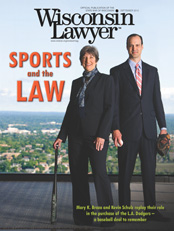Sneak Peek: Historic Baseball Transaction Anchors September Wisconsin Lawyer

Sept. 7, 2012 – This year, Milwaukee lawyers helped an investment group purchase the L.A. Dodgers for a record $2.15 billion. In the September Wisconsin Lawyer, available online and in mailboxes soon, learn about the deal and a local law firm’s rise to prominence in sports law.
Also, don’t miss an important article on employee background checks, and another on how laws impact personal injury settlements involving Medicare beneficiaries. And, recognizing Juror Appreciation Month, learn about one lawyer’s eye-opening experience on a Texas jury.
A Historic Sports Deal
In our cover story, “Sports and the Law: A National Niche and a Baseball Deal to Remember,” State Bar legal writer Joe Forward unravels the L.A. Dodgers deal, the biggest transaction in sports history to date, noting rules and authorities under the Major League Constitution.
Forward interviewed Milwaukee lawyers Mary K. Braza and Kevin Schulz of Foley & Lardner LLP, which represented the purchasers on the deal – including Earvin “Magic” Johnson – and uncovered the interesting story of Foley’s rise to national prominence in the sports industry.
“Underneath America’s favorite pastime lies a complex legal and business world,” writes Forward, noting Foley’s increasing role in big sports transactions, starting with the Milwaukee Brewers and including the Chicago Cubs, the Texas Rangers, and other major sports franchises.
From telecast rights to intellectual property, and other areas in between, the article explains the lawyers’ role in baseball franchise transactions. In addition, Braza and Schulz offer other insights on sports franchise owners and the industry in a WebXtra video available online.
Employee Background Checks
In their article “Skeletons in the Closet?: Minimizing the Risks of Background Checking,” employment lawyers Jon Anderson and M. Scott LeBlanc discuss “how different laws can shape the substance and form of any background check,” and the liabilities at stake.
“Dramatic technological advances, combined with general economic uncertainty, have significantly changed the scope and nature of background checks over the past few years,” they write, noting easy access to background information through the Internet.
“At the same time, an intensely competitive job market has allowed employers to be more selective with staffing decisions, giving job applicants greater incentive to be misleading about potentially damaging background information,” the authors explain.
Anderson (Madison) and LeBlanc (Milwaukee), both of Godfrey & Kahn S.C., also discuss the U.S. Equal Employment Opportunity Commission’s “increased interest” in enforcing laws related to illegal background checking, and provide tips and best practices to avoid liability.
Personal Injury Settlements and Medicare
Does the federal government have claims to personal injury settlements involving Medicare beneficiaries? In this article, “Medicare’s Stakes in PI Settlements,” St. Paul attorney Aaron Frederickson tackles the question under the Medicare Secondary Payer Act (MSPA).
After MSPA’s enactment in 1980, little was done to protect Medicare’s interests in personal injury settlements, Frederickson explains. But legal mechanisms that allow the government to track personal injury settlements with Medicare beneficiaries changed the landscape.
“[W]ith the advent of increasing enforcement of the MSPA in worker’s compensation claims, attorneys practicing in the area of automobile and general liability cases are starting to realize that they too need to consider Medicare’s interests when settling clients’ claims,” he writes.
Jury Service through a Lawyer’s Eyes
In recognition of September as Wisconsin’s Juror Appreciation Month, attorney James Casey Jr. gives a personal account of his experience while serving on a sentencing jury in Texas.
The case involved a U.S. Army private charged with intoxication manslaughter and four other felonies. The accused drove drunk and collided with another car, killing one person.
Casey currently works at the University of Texas, San Antonio, and practiced criminal law in Wisconsin. In “Jury Service – Through an Attorney’s Eyes,” Casey describes the experience as “sad, fascinating, and memorable.” Unlike Wisconsin, where judges decide sentences, juries decide sentencing in Texas. Casey served as jury foreman in the sentencing phase.
“I have heard many comments over the years from people who do whatever they can to avoid jury service because they feel it is a useless exercise or a waste of time,” Casey writes. “I was raised and educated to believe jury service is an important responsibility of citizenship; from my experience in this case, I definitely know this to be true.”
Ethics and Technology
In “The Ethics of Cloud-based Services,” State Bar of Wisconsin Practice Management Advisor Nerino Petro explains the ethical implications of storing confidential information online.
“Storing confidential and privileged information online makes it easier for lawyers to practice anywhere, anytime, but also raises the specter of potential damage from disclosure if this information is accessed and distributed on the Internet by unauthorized individuals,” he writes.
Petro discusses the storage technology sources available in light of a lawyer’s standard of care under Wisconsin’s Rules of Professional Conduct. He concludes that ultimately, “whether a specific Internet/cloud product or service meets a standard of reasonable care is a question that must be answered by each attorney until more definitive guidelines are provided.”
Finally, in the monthly ethics column, attorney Dean Dietrich, past chair of the State Bar Professional Ethics Committee, discusses what happens “When Client and Lawyer Interests Conflict.” In these uncommon situations, “the lawyer must engage in a conflicts analysis to determine whether the lawyer can represent the client,” Dietrich writes.
